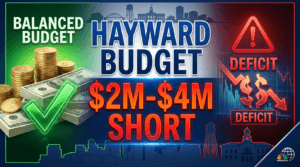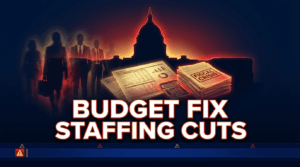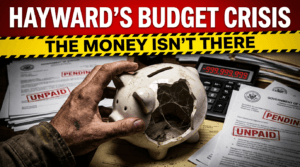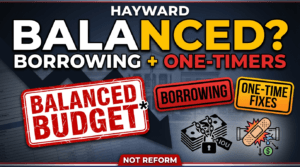HAYWARD’S GARBAGE RATE HIKE: HOW RESIDENTS CAN FIGHT THE 3.1% INCREASE
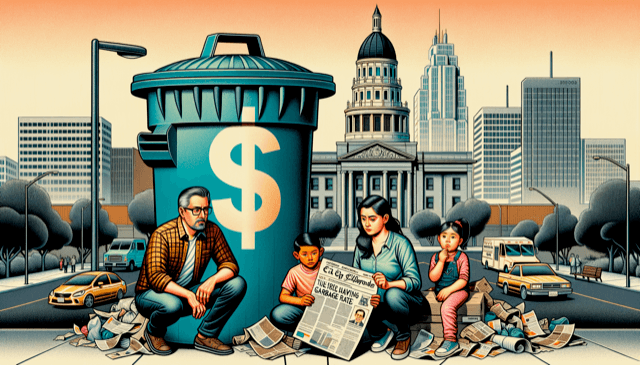
Mayor Salinas and Council Approve Higher Trash Bills While Residents Struggle With Rising Costs

I’ve discovered that Mayor Salinas and the Hayward City Council have quietly approved a 3.1% garbage and recycling rate hike that will hit every household and business in the city starting March 1, 2025. This increase, which was approved with minimal public discussion at the January 28th council meeting, will further strain family budgets already stretched thin by rising costs for housing, food, and utilities.
THE IMPACT ON YOUR WALLET
I’ve analyzed the new rate schedule and calculated exactly how much more residents will pay under Mayor Salinas’s approved increase:
| Service Level | Current Monthly Rate | New Monthly Rate | Annual Increase |
| 20-gallon cart | $30.26 | $31.20 | $11.28 |
| 32-gallon cart | $44.22 | $45.59 | $16.44 |
| 64-gallon cart | $78.87 | $81.31 | $29.28 |
| 96-gallon cart | $113.47 | $116.99 | $42.24 |
“Mayor Salinas and the council just keep approving these annual increases without ever questioning whether they’re necessary,” said Maria Gonzalez, a longtime Hayward resident who attended the January meeting. “They claim it’s just following the contract with Waste Management, but they never push back or look for ways to save residents money.”
RATE INCREASE JUSTIFIED BY QUESTIONABLE CPI FORMULA
I’ve investigated the justification for this rate hike and found it’s based on a Consumer Price Index (CPI) adjustment formula included in the city’s franchise agreement with Waste Management of Alameda County (WMAC). This agreement, which Mayor Salinas and the council approved in 2023, locks Hayward into annual increases through 2033.
Public Works Director Ameri, who presented the rate increase to the council, offered no analysis of whether the 3.1% increase accurately reflects WMAC’s actual cost increases or whether the company could absorb some of these costs rather than passing them directly to residents.
“The council didn’t ask a single critical question about this increase,” noted Javier Rodriguez, who regularly attends council meetings. “Mayor Salinas just nodded along as if residents have unlimited money to keep paying more and more every year for the same service.”
HOW RESIDENTS CAN FIGHT BACK AGAINST THE RATE HIKE
I’ve researched practical strategies that Hayward residents can use to reduce their garbage bills and effectively fight back against Mayor Salinas’s approved rate increase:
- Downsize Your Cart: The most immediate way to save is switching to a smaller garbage cart. Moving from a 32-gallon to a 20-gallon cart saves $173 annually. I’ve confirmed with WMAC customer service that residents can request a smaller cart by calling (510) 537-5500.
- Apply for Low-Income Discount: I’ve discovered that qualifying low-income residents can receive an $11.86 monthly discount ($142.32 annually), but Mayor Salinas and the council have done little to publicize this program. Call WMAC to apply.
- Reduce Contamination: The new rate schedule includes penalties of $26.73 for the third and subsequent contamination violations. I’ve learned that properly sorting recyclables and organics can avoid these charges.
- Compost at Home: By composting food scraps at home, I’ve calculated that residents can reduce organic waste volume by up to 30%, potentially allowing for a smaller garbage cart.
- Organize Neighborhood Bulk Pickup Sharing: The rates allow for two free bulky waste pickups annually. I’ve found that neighbors can coordinate these pickups to share disposal of large items, maximizing this included service.
- Attend Council Meetings: The most effective long-term strategy is showing up at council meetings when garbage rates are discussed. “Mayor Salinas and the council count on residents not paying attention to these increases,” said community activist Ro Aguilar. “If enough people show up and demand accountability, they’ll have to listen.”
COMMERCIAL CUSTOMERS HIT EVEN HARDER
I’ve analyzed the commercial rate increases and found that businesses will face even steeper hikes. A small business with weekly pickup of a 2-cubic-yard bin will now pay $350.31 monthly—a significant expense that will inevitably be passed on to customers through higher prices.
“Mayor Salinas talks about supporting small businesses, but then approves these automatic rate increases that hit our bottom line,” said Navpreet Khabra, who owns a small restaurant in downtown Hayward. “We’re still recovering from the pandemic and inflation, and now we have to absorb another cost increase.”
QUESTIONABLE CONTRACT TERMS FAVOR WASTE MANAGEMENT
I’ve examined the franchise agreement that Mayor Salinas and the council approved with WMAC and found troubling provisions that guarantee the company annual increases regardless of actual cost changes or service quality.
The 10-year contract, which runs through 2033, includes no performance metrics that would allow the city to withhold rate increases if service quality declines. It also lacks any mechanism for the council to reject or modify proposed increases if they’re deemed excessive.
“Mayor Salinas essentially gave WMAC a blank check to keep raising rates for the next decade,” said former city finance analyst Christina Morales. “The council should have negotiated better terms to protect residents, but they just rubber-stamped whatever was put in front of them.”
CONCLUSION: RESIDENTS DESERVE BETTER
I believe the 3.1% garbage rate increase approved by Mayor Salinas and the council represents yet another example of this administration failing to prioritize the financial well-being of Hayward residents. While the increase may seem small in percentage terms, it adds up to significant dollars over time for families already struggling with California’s high cost of living.
By implementing the cost-saving strategies I’ve outlined, residents can fight back against this latest rate hike. But the broader solution requires greater accountability from Mayor Salinas and council members who continue to approve automatic increases without questioning whether they’re truly necessary or justified.
Hayward residents deserve a city government that works as hard to save them money as it does to raise their rates. Until Mayor Salinas and the council start prioritizing residents’ financial interests over automatic rate increases, the burden falls on each household to take action to reduce their own garbage bills.
Tom Wong is an investigative reporter focusing on municipal governance and fiscal accountability in Hayward and the greater Bay Area.



